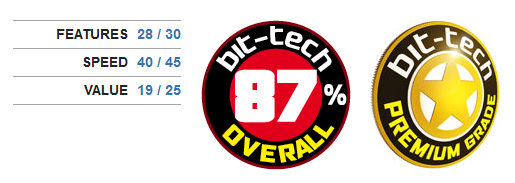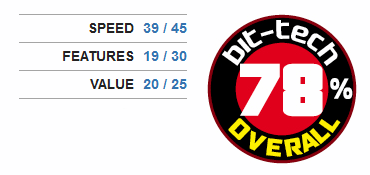X99 Motherboard Group Test: Asus, EVGA, Gigabyte and MSI
September 9, 2014 | 18:50

Performance Analysis
At stock speed there was some variation in the results, namely due to the slightly different stock speed settings and differing Turbo Boost aggression amongst the boards. We had to set the Asus X99 Deluxe manually to 2,666MHz RAM using a strap of 125MHz and this forced the CPU to sit locked at 3.5GHz. This resulted in higher idle power consumption as well as slightly better performance in some tests.For instance, it enjoyed a 3fps lead in the minimum frame rate in Bioshock Infinite and came top in both our CPU-intensive rendering tests, Cinebench R15 and Terragen 3. Gigabyte's GA-X99-Gaming 5 was also fairly rapid, while the MSI X99S SLI Plus and EVGA X99 Micro often didn't boost as high, resulting in slightly slower results in some tests at stock speeds. There was little to report in the storage tests with negligible variation really with the one exception being to avoid the ASMedia SATA 6Gbps ports on the X99 Deluxe if you have a modern SSD, as it will bottleneck performance.
Audio performance was generally very good across the board, with better-than average results for all the models on test. Asus and EVGA come out on top here with some exceptional numbers. Gigabyte's lavish audio credentials didn't wow RightMark's Audio Analyser but were still above what you'd expect from standard on-board audio, plus it does have a dedicated USB port for DACs.
Click to enlarge
Once overclocked, it wasn't surprising to see MSI's X99S SLI Plus in the top spot in most of the tests thanks to its slight clock speed advantage at 4.3GHz. This gave it a 4fps advantage in minimum frame rate compared to the GA-X99-Gaming in Bioshock Infinite and also some nifty times in the video encoding, image editing and rendering tests too.
The lowest power consumption on test at idle was courtesy of the GA-X99-Gaming, which managed just 70W using 2,133MHz RAM and 86W at 2,666MHz. Under load, MSI's X99S SLI Plus was the most power-efficient, while Asus's 314W at stock speed and 478W when overclocked were the highest on test.
Conclusion
There's quite a bit to take in here not just in terms of price and value but in performance terms too. Money being no object, Asus has come up with the goods in spectacular fashion with the X99 Deluxe. It looks fantastic, comes with a mass of useful features and will provide a perfect home for multi-GPU systems too. Its price is a high one, but it certainly feels like it's worth the extra over the other boards on test.In the £160-200 price bracket, EVGA's X99 Micro doesn't really offer much except decent on-board audio performance and its smaller form factor. If you need a micro-ATX X99 board then it's worth a look although you might want to wait till we've had hands on with ASRock's X99M Killer first. The final two options from MSI and Gigabyte are both solid boards but the real sticking point for the MSI X99S SLI Plus is its 16x PCI-E slots configuration for multi-GPU setups.
The Gigabyte board is better here as it gives more space so if you're air-cooling at least, the latter board would be our choice. If you're water-cooling or only using a single graphics card, then the MSI X99S SLI Plus offers good overclocking and a very reasonable price tag but perhaps lacks pizazz compared to the other boards on test.
Scores
Asus X99 Deluxe

MSI X99S SLI Plus

Gigabyte GA-X99-Gaming 5

EVGA X99 Micro


MSI MPG Velox 100R Chassis Review
October 14 2021 | 15:04









Want to comment? Please log in.